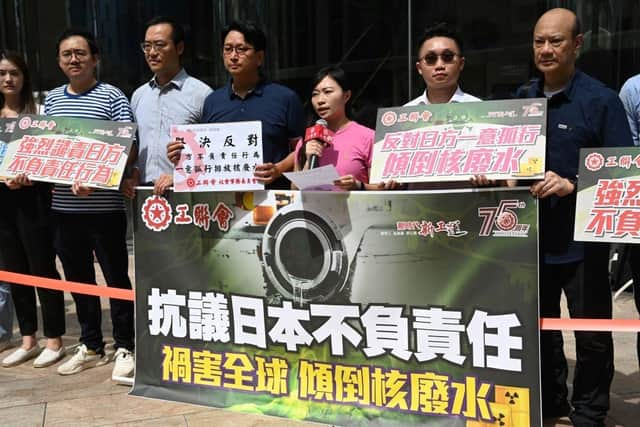Japan Fukushima water: Could the release of radioactive water from nuclear plant affect seafood eaten in Scotland?
The Japanese government has said a release of water from the disaster-hit Fukushima nuclear plant could happen as early as Thursday, despite fears over the safety of the move.
Prime Minister Fumio Kishida said the release of the water is essential for the progress of the plant decommissioning and Fukushima prefecture's recovery from the earthquake and tsunami in March 2011, which destroyed the Fukushima Daiichi plant's cooling systems, causing three of its reactors to melt and contaminating their cooling water.
Advertisement
Hide AdAdvertisement
Hide AdA Scottish seafood consultant has warned that he would “steer clear” of seafood from the waters around Japan until the full effects of the release of the water are known.


Protesters, including politicians in neighbouring South Korea, have opposed the plans, warning it will put off people across the globe from buying seafood from the region’s waters, hitting the livelihoods of local fishermen.
Hong Kong has implemented a ban on some Japanese seafood, starting on Thursday.
Owen Stevens, director of Edinburgh-based seafood consultancy Fishwise and an advisory member of the Scottish Government’s Scottish Aquaculture Council, said: “I would approach any seafood imports from that region with caution. We just do not know yet what will happen or what the effects are going to be. I think the radiation is something that will affect the entire food web for some time.”
Japan’s main seafood exports are scallops, mackerel, yellowtail, tuna, and processed sea cucumber – however, the UK is not a major import market for Japanese seafood.
Mr Stevens pointed to official data which showed the value of imports of Japanese seafood to the UK in 2021 was just over £7.8 million, but said the figure had approximately doubled between 2019 and 2021, primarily driven by large increases in imports of seaweed and tuna.
He added: “I think one of the main effects of this is likely to greatly increase seafood imports to Japan, which is one of the highest seafood-consuming nations in the world.”
Mr Kishida gave the final go-ahead at a meeting of Cabinet ministers involved in the plan on Tuesday and instructed the operator, Tokyo Electric Power Company Holdings (Tepco), to be ready to start the coastal release on Thursday if weather and sea conditions permit.
Advertisement
Hide AdAdvertisement
Hide AdThe water release is likely to take place over a period of 30 years.
The contaminated water is currently held in around 1,000 tanks, which are due to reach capacity early next year.
Mr Kishida insisted the government has done everything for now to ensure the plan's safety, protect the reputation of Japan's fishing industry and clearly explain the scientific basis to gain understanding in and outside the country.
He pledged that the government will continue those efforts until the end of the release and decommissioning, which will take decades.
"The government will take responsibility until the disposal of Alps (advanced liquid processing system) treated water is completed, even if it takes several decades," he said.
The International Atomic Energy Agency (IAEA) concluded in a final report in July that the release, if carried out as designed, will have a negligible impact on the environment and human health.
After taking into account possible bioconcentration of low-dose radionuclides that still remain in the water, the environmental and health impact is still negligible, Tepco officials said.
Comments
Want to join the conversation? Please or to comment on this article.
